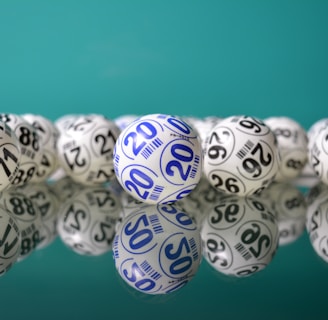Can AI Predict Lottery Numbers? A Deep Dive Into AI-Powered Lottery Predictions
Discover the story of Mr. Li from Anhui who won a small prize using AI-generated lottery numbers. Can AI truly predict lottery outcomes, and what does the future hold for AI in gambling?
TECH & DIGITAL
Mark
2/13/20253 min read


Recently, Mr. Li from Wuhu, Anhui, posted an intriguing story online, claiming he won a small prize in the China Sports Lottery's Double Chromosphere (双色球) game by using numbers recommended by an AI system called DeepSeek. Li, a first-time lottery player, decided to try his luck by placing five sets of numbers suggested by DeepSeek, totaling 10 yuan. One of those sets hit the “2+1” combination, earning him a prize of 5 yuan, which, although modest, was enough to make him feel like the AI prediction was on track.
Li's experience has sparked some debate on whether AI can indeed predict lottery outcomes and whether systems like DeepSeek can provide a meaningful edge in the lottery. But as he humbly pointed out, the small win doesn’t mean that he’ll continue relying on AI-generated numbers. “I won three numbers, which is quite impressive, but I don’t want to get too carried away,” he said, suggesting that AI lottery predictions should be treated cautiously.
In this article, we will explore the role of AI in lottery predictions, evaluating its potential effectiveness, discussing the science behind AI-generated numbers, and weighing the odds of actually winning the lottery with AI assistance.
The Science Behind Lottery Predictions and AI
The idea of using AI to predict lottery numbers is intriguing but far from a straightforward science. Lotteries like the Chinese Double Chromosphere (双色球) and Powerball are inherently designed to be random, and the numbers drawn are statistically independent of each other. In theory, no pattern exists that can be consistently predicted.
However, AI systems like DeepSeek and others in the gambling industry employ algorithms based on machine learning to analyze vast amounts of past data, looking for trends or patterns in number selections. These systems might not predict the exact winning numbers but could attempt to identify numbers that are drawn more frequently over time, giving users a statistical edge in their number selection.
AI-powered lottery systems typically operate by analyzing large data sets of historical lottery draws, identifying patterns or trends in number distribution. While this can help players select combinations of numbers that have appeared more often in the past, the lottery itself remains a game of chance, where the likelihood of winning is extremely low.
Can AI Beat the Odds?
Despite the hype, it is important to understand that winning the lottery is, in essence, a game of pure chance. The odds of winning a major lottery like the Powerball or the Double Chromosphere are astronomical, often in the millions-to-one range. Even though AI can help in data analysis, its predictive power is still limited by the randomness inherent in lottery systems.
Mr. Li’s experience of winning a small prize with AI-recommended numbers is an example of how AI can give players a fun, data-driven approach to choosing numbers, but the odds of winning are still governed by pure probability. A win, especially a minor one, should not be interpreted as a breakthrough in AI-powered lottery prediction.
While AI might provide some marginal improvement in the selection process, the idea that it can predict the exact winning combination remains speculative. Lotteries are designed to be unpredictable, and while AI can analyze data patterns, it cannot change the fundamental structure of random number selection.
The Psychology of AI in Gambling
The role of AI in gambling is also a psychological one. For many players, using AI to select lottery numbers might increase the excitement and provide a sense of involvement in the game. The concept of using technology to enhance one’s chances—whether it’s in a lottery or a sports bet—can make the experience more engaging, especially for players looking for a way to feel more in control of their luck.
However, the same psychology can lead to "chasing losses" or excessive gambling. This is where the dangers of AI in gambling lie—players may start to over-rely on AI systems and treat them as a foolproof method of winning, which is not the case. As Li pointed out, after his small win, he doesn't plan on continuing to use AI for lottery plays, showing a healthy approach to the idea that AI-generated predictions are still a gamble, not a guaranteed victory.
The Future of AI in Gambling and Lotteries
Looking ahead, AI will continue to evolve and may find more applications in the gambling industry, particularly in areas such as personalized gaming experiences, responsible gambling solutions, and optimization of betting strategies. Some systems already use AI to track patterns in gambling behaviors and help predict and curb problem gambling.
In the case of lotteries, AI could potentially assist in analyzing trends, optimizing game offerings, or even customizing experiences for players. However, AI's use as a direct tool for predicting lottery outcomes will likely remain limited due to the inherently random nature of such games.
Conclusion
While Mr. Li's small win using DeepSeek's AI-recommended numbers is an interesting story, it doesn't prove that AI can reliably predict lottery outcomes. Lottery games are designed to be random, and although AI can analyze historical data and patterns, it cannot change the fundamental odds of winning. As AI technology continues to evolve, we may see it play a greater role in enhancing the gaming experience, but players should always remember that lottery predictions, whether generated by AI or not, are ultimately just a matter of luck.
